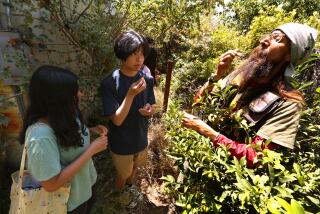HUNTINGTON PARK : Students Taught to Keep a Lid on Anger
- Share via
What makes you angry?
Consultant Floyd McGregor asked three middle-school boys to identify what triggers their anger. Typical answers: “When my mom yells at me.” “When someone looks at me the wrong way.” “When my sister calls me names.”
McGregor is helping some of the 3,600 students at Chester W. Nimitz Middle School control aggressive behavior and build self-esteem through “Think First,” a children’s program written by Judy McBride, a Long Beach Unified School District counselor.
“Aggressivity is a more stable trait in children than intelligence. We teach them to be in control of their thoughts, rather than focusing on their feelings,” said McBride, who has trained 600 California educators how to use the program.
The program teaches sixth- through eighth-graders to think before they act, he said. To control their tempers, students are encouraged to breathe deeply, count backward and chant their own personal mantra, such as “Kick it.”
To increase self-esteem, counselors give points for correct behavior and frequently dole out rewards such as candy and pizza. And program graduates are treated to a party during the last class period.
Students, primarily boys, are chosen for the 10-week program based on the number of times they have been sent to the school office. Participants tend to display a pattern of violence, said Henry Gittler, Nimitz psychologist.
In the 18 months since the program’s inception, students, parents and teachers said they have seen dramatic results in the 30 participants, Gittler said. “In our last group of six, (just) one child has been sent to the dean’s office twice in 14 weeks. This is absolutely miraculous,” he said.
Parents have cried when they described how their children talked back less, fought with siblings less often, and brought home fewer complaints from school, said Rebecca Bejar, a psychiatric social worker at Nimitz.
Administrators said they are also seeing unexpected secondary effects from the program. When students can control their anger, grades rise and they attend class more often, said McGregor, who hopes to expand the program to other schools in the district.
Principal Lupe Simpson said children are bonding with one another and pay more attention to their teachers and to her after attending the sessions. “I notice a definite change in attitude,” she said. “Kids who would ignore me before now make a point of saying ‘hi’ to me in the halls and to ask how I am.”
More to Read
Sign up for Essential California
The most important California stories and recommendations in your inbox every morning.
You may occasionally receive promotional content from the Los Angeles Times.













